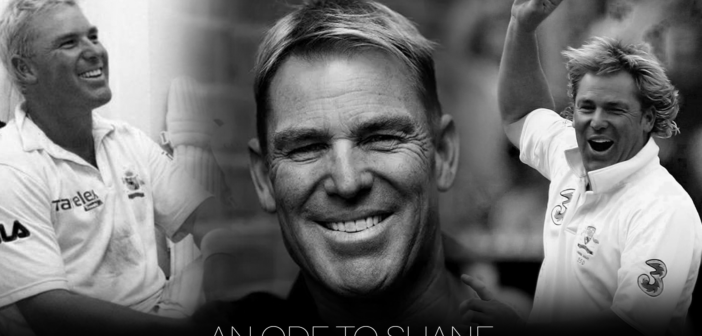Blonde tips. Zinc cream dripping down his nose. Baggy undone whites.
A moment that can be only truly defined in the graphological form. Not only does it transcend Australian cricketing history, but Cricket, the sport he loved so dearly, in its entirety.
It’s captured as the moment Shane Keith Warne announced himself onto the cricketing scene. In truth, it was the delivery that the dying art of leg-spin recaptured its fashion, and an icon of sport itself thrusted himself into the limelight.
As quickly as he entered the world of greatness, and gave so much to the world of cricket, he departed us. After wishing his own condolences to another Australian great in Rodney Marsh, his own passing would meet him in Thailand, as announced today by his management and family.
So this is my ode to Shane. A charismatic yet troubled genius who transcended generations worldwide.
The Entrance
The sporting year 1993 was one known for change and discovery. After the Premier League was formed, Sir Alex Ferguson’s Manchester United had won their first Premier League title, Pete Sampras won his first Wimbledon title, and Australia fell upon their finest bowling talent of all time.
A 23-year-old Shane Warne arrived in England, captained by Allan Border, hoping to retain their Ashes title from two years previous.
He’d made his debut the year before in India, in which he took match figures of 1/228 (the wicket of Ravi Shastri) and then failed once more in the following test, taking 0/107. Then he took three wickets without conceding a run to win by just 16 runs against Sri Lanka, which personified the inconsistency and bravado he had to learn to control.
This rough diamond stood out like a sore thumb. Blonde tips. Zinc cream dripping down his nose. Baggy undone whites. What came next defined the art he crafted, and the generation who watched at Old Trafford and beyond.
Ambling in from a five-yard stride, Warne pitched the ball on a good length outside leg-stump to former England captain Mike Gatting.
Spinning from right to left, it left the Kingsbury-born batsman deceived so much that he played and missed as the ball struck the top of off.
Umpire Dickie Bird stood and shivered, maybe because of the weather, but the steel in his eye saw the historic moment he had just witnessed.
Gatting trundled off, totally clueless and constantly looking back at the wicket as to what had just happened. Was this the true reality he had found himself within? Despite having an extinguished career, Gatting would now be forever recognised as the man beaten by the ball of the century.
“That Gatting ball changed my life,” said Warne, speaking in 2018.
“First ball, it was the perfect leg break. To do it in the first ball of the Ashes series was just meant to be. The way it changed my life was amazing. There were kids at every County Ground I went to wearing Zinc cream, bowling leggies to their Dads. I was 23-years-old.
“It was very hard to take at the time, walking out of the hotel followed by 20-30 photographers even to the bar, or pub just to have a beer. There was no school that taught that, so what I wanted was just to be honest, up-front and be me. I made plenty of silly mistakes but I’ll never pretend to be something I’m not.”
The Impact
There are two impacts I can discuss within the piece – one, his impact on world cricket – the other on me.
In cricket, it is hard to define how much Warne changed the background and structure in his multitude of roles in the sport.
From 1992 to 2007, he took 1001 international wickets, taking 1319 in first-class cricket alone and 70 in T20 matches. In numbers alone, the impact is vast.
His endlessly repeatable action meant he could bowl marathon spells and such was his accuracy that, alongside being a demon attacking weapon, he was also tight-fisted in terms of leaking runs.
Not only that, but the resurrection of the dying art of spin will imprint Warne into cricket’s woven legacy forever. The proliferation of spin bowlers in almost every side in a game that in his time was dominated by relentless pace tells the tale.
All was not plain sailing for Warne, having failed a diuretics test in 2003 leading to a years’ ban from cricket. This led to him picking up a taste for broadcasting, which he would endeavour into further later on in his life.
He returned and eventually became one of the founding captains in the Indian Premier League, leading Rajasthan Royals to the maiden title in 2008. The tournament is now the biggest franchise competition in world cricket. Aditya Iyer wrote this after his retirement in 2013:
“To become an overnight success, the IPL institution desperately needed a fairytale, an ashes to glory story. And Warne, a cricketer, poker pro, rock star, hair expert, newsmaker and an alleged sex offender -all rolled into one – gave it to them. The world will never know the path IPL would’ve charted had Warne’s glorious brush with leadership not unfolded like a soap opera in the first season, but one thing is for sure – the world, and the IPL, is richer with the experience.”
After he retired, as mentioned, he took up a career in broadcasting – becoming a familiar voice for Sky Sports watchers in particular in England.
To me, though, Warne’s impact is something I’ll treasure.
I was born in 2002, and before my cricketing sentience had truly arrived, Shane Warne was long retired. But luckily, I had a brother born in 1997 – five years older, and a cricket-mad father.
I was lucky to truly appreciate the greatness of cricket firstly in the Ashes of 2009, where Andrew Flintoff said farewell, and the Stuart Broad/Jimmy Anderson partnership first showed its formidability.
We were already regulars at the junior section of our local cricket club, and began playing our own ‘world legends’ test matches in the garden. It was brilliant for us, not so much for the neighbours who heard the thud of the ball on the fences on a regular basis.
My brother always wanted to be a ‘leggie’, and always pretended to be Warne. Granted, he could probably spin it more on the patio wicket we played on in those long summer days in the late noughties and early teens – but I doubt he could do it anywhere else!
For me, for my brother, my everyone – Warnie was a legend taken from us far too soon. And with young death it will take time to process. All thoughts go out to his family,
The Tributes
Despite my best efforts, here are some of Warne’s competitors and teammates who adored him from a more personal angle.
“It is impossible to exaggerate the impact Shane Warne had on this club during his time with us between 2000 and 2007. Players, members, management and staff are all united in their grief at the shocking news of his untimely passing.
“Warney had established many enduring friendships here at Hampshire and I feel privileged to regard myself as one of these. No doubt, like me, many will be struggling to process the tragic news and come to terms with his loss.
“For me, Shane Warne stands alone as the greatest spin bowler of all time. He was also an inspirational leader and brilliant tactician. He believed that any match could be won from any position and was good enough to fulfil this prophecy himself on many occasions.
“What’s more, as Hampshire captain, he convinced the players to believe in his philosophy and established Hampshire as a major force in all forms of professional cricket.
“Off the field, he was competitive, fun, naughty and lovable in equal measure. He used to say “just because I occasionally do stupid things, it doesn’t mean I’m stupid” and he couldn’t have shown greater self-awareness.
“Shane Warne has made an indelible impact on the world in his tragically short time here, transcending his sport and becoming an international icon. He will be hugely missed by all those who knew him and my thoughts right now are with Keith, Bridgette, Brooke, Jackson and Summer.”
“I’m utterly shocked and saddened. Shane Warne was cricket’s greatest star and he was a guy who, I suppose, you felt the rules of life didn’t apply to him.
“To hear about his untimely demise is genuinely shocking and I know the whole cricket world is in a great deal of mourning.
“He was the greatest showman. There were other great cricketers when you look at their records, who would potentially equal Shane’s or maybe better it. But there was no greater star in cricket than Shane Warne, certainly in the time I have been around.
“You felt every time you were on the pitch against him it was his show and you were just a small part of his show. He used that to his advantage in terms of getting you out.
“He had such charisma and such a passion for the game that it was infectious, so if you were lucky enough to spend time with him off the pitch, it was always a privilege.
“A man of great generosity of spirit, great passion for the game and a man who is going to be sorely missed.”
Former England Captain, Andrew Strauss.
David Warner, Australia international
Shane Warne made me fall in love with the game as an 8-year-old and he has completely inspired me every day since. I am so honoured and lucky to have been able to spend time with him and learn from him. He was everything I could have asked for and so much more. RIP to the King.”
Mason Crane, England Leg-Spinner
“Australian cricket, along with the whole cricketing world, is in a state of shock at the loss of Shane Warne, a true cricketing genius, who has died aged 52.
“Warne almost single-handedly reinvented the art of leg-spin when he burst onto the international scene in the early 1990s, and by the time he retired from international cricket in 2007 he had become the first bowler to reach 700 Test wickets.
“A central figure in Australia’s ICC Cricket World Cup triumph in 1999, when he was player of the match in both the semi-final and the final, Wisden Cricketers’ Almanack recognised Shane’s achievements by naming him as one of its Five Cricketers of the Twentieth Century.
“Shane’s strength of character and enormous resilience saw him bounce back from career-threatening finger and shoulder injuries, and his stamina, his sheer will to win, and his self-belief were key factors in Australia’s great side in the late 1990s and early 2000s.”
Cricket Australia
Follow us on Twitter @ProstInt
![Prost International [PINT]](https://prostinternational.com/wp-content/uploads/2021/08/PINTtFontLogoRoboto1536x78.jpg)



